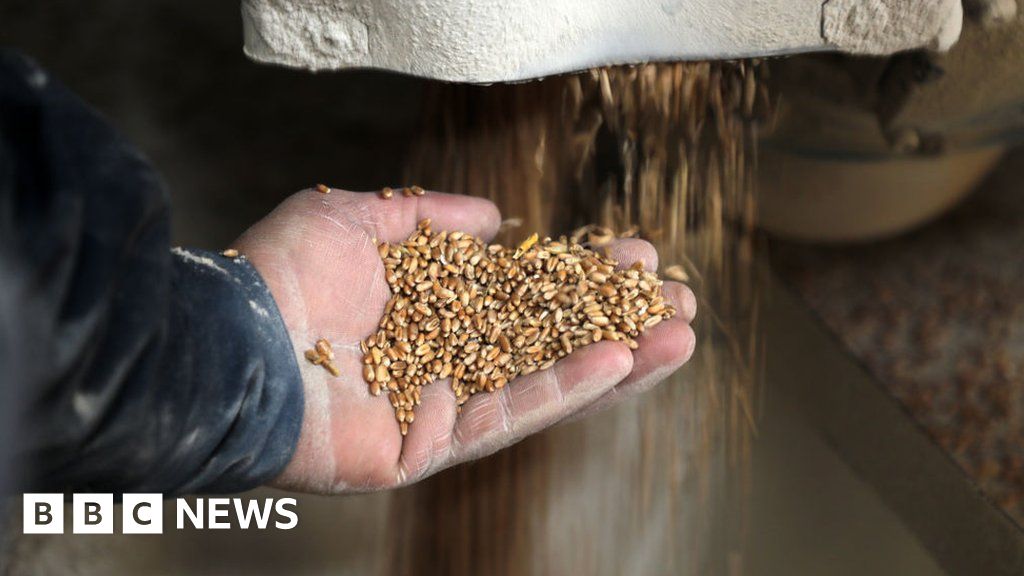Ukraine war 'catastrophic for global food'
By Emma Simpson
Business correspondent, BBC News
Yara International, which operates in more than 60 countries, buys considerable amounts of essential raw materials from Russia.
Fertiliser prices were already high due to soaring wholesale gas prices.
Yara's boss, Svein Tore Holsether, has warned the situation could get even tougher.
"Things are changing by the hour," he told the BBC.
"We were already in a difficult situation before the war... and now it's additional disruption to the supply chains and we're getting close to the most important part of this season for the Northern hemisphere, where a lot of fertiliser needs to move on and that will quite likely be impacted."
Russia and Ukraine are some of the biggest producers in agriculture and food globally.
Russia also produces enormous amounts of nutrients, like potash and phosphate - key ingredients in fertilisers, which enable plants and crops to grow.
"Half the world's population gets food as a result of fertilisers... and if that's removed from the field for some crops, [the yield] will drop by 50%," Mr Holsether said.
"For me, it's not whether we are moving into a global food crisis - it's how large the crisis will be."...
"The company [Yara] says it's making day-to-day evaluations on how to maintain supply and that it is too early to say if more shutdowns may be on the cards.
It acknowledges it has a "very strong obligation" to keep production running at what it describes as a critical point.
But Yara's boss says the world must, in the long-term, reduce its dependency on Russia for global food production.
"On the one hand, we're trying to keep fertiliser flowing to the farmers to keep up the agricultural yields.
"At the same time... there has to be a strong reaction. We condemn the Russian military invasion of Ukraine so this is a dilemma and one that frankly is very difficult."
Climate change and growing populations had already been adding to the challenges the global food production system faces - all before the pandemic started.
The Yara International chief executive describes the war as "a catastrophe on top of a catastrophe", highlighting just how vulnerable to shocks the global food supply chain now is.
It will increase food insecurity in poorer countries, he adds.
"We have to keep in mind that in the last two years, there's been an increase of 100 million more people that go to bed hungry... so for this to come on top of it is really worrying."
By Emma Simpson
Business correspondent, BBC News
Yara International, which operates in more than 60 countries, buys considerable amounts of essential raw materials from Russia.
Fertiliser prices were already high due to soaring wholesale gas prices.
Yara's boss, Svein Tore Holsether, has warned the situation could get even tougher.
"Things are changing by the hour," he told the BBC.
"We were already in a difficult situation before the war... and now it's additional disruption to the supply chains and we're getting close to the most important part of this season for the Northern hemisphere, where a lot of fertiliser needs to move on and that will quite likely be impacted."
Russia and Ukraine are some of the biggest producers in agriculture and food globally.
Russia also produces enormous amounts of nutrients, like potash and phosphate - key ingredients in fertilisers, which enable plants and crops to grow.
"Half the world's population gets food as a result of fertilisers... and if that's removed from the field for some crops, [the yield] will drop by 50%," Mr Holsether said.
"For me, it's not whether we are moving into a global food crisis - it's how large the crisis will be."...
"The company [Yara] says it's making day-to-day evaluations on how to maintain supply and that it is too early to say if more shutdowns may be on the cards.
It acknowledges it has a "very strong obligation" to keep production running at what it describes as a critical point.
But Yara's boss says the world must, in the long-term, reduce its dependency on Russia for global food production.
"On the one hand, we're trying to keep fertiliser flowing to the farmers to keep up the agricultural yields.
"At the same time... there has to be a strong reaction. We condemn the Russian military invasion of Ukraine so this is a dilemma and one that frankly is very difficult."
Climate change and growing populations had already been adding to the challenges the global food production system faces - all before the pandemic started.
The Yara International chief executive describes the war as "a catastrophe on top of a catastrophe", highlighting just how vulnerable to shocks the global food supply chain now is.
It will increase food insecurity in poorer countries, he adds.
"We have to keep in mind that in the last two years, there's been an increase of 100 million more people that go to bed hungry... so for this to come on top of it is really worrying."

Comment